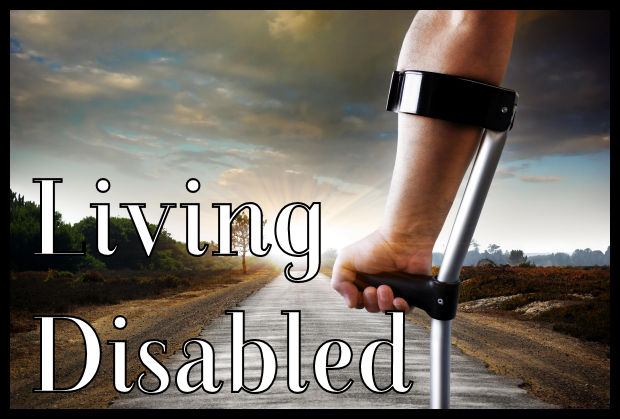
Since disability directly impacts my husband’s and my lives, I thought I would post a multi-part interview with him on the blog about what it’s like to be disabled in today’s world. Of course, this is just from our experiences, but almost everyone who is disabled will have some crossover with others in the impacts that having a disability can make. So, here’s part one.
Interview Part 1:
1: Let’s start out with how your disability affects you on a physical level.
Sam: I have two disabilities: Type one diabetes, and a neurological condition.
For my diabetes: I have to watch what I eat, and have to constantly monitor my blood sugar levels. If I go too low, I become incapacitated, mentally and physically. I cannot drive, or do much of anything, when I’m like this and I have to bring the blood sugar up or I can go into a diabetic coma. I have to inject insulin several times a day. I cannot consume alcohol, since it can kill me due to the effects it has on blood sugar. If I’m not careful, I can develop diabetic neuropathy.
For my neurological issues: I’m unable to walk normally. I use a cane to help me get around, and as of about three years ago, I began using a walker so that I can get around the house more easily and for use on long trips. I never bring the walker to the gym, since it would get in the way.
I cannot run, jump, balance that well, or throw/catch. I talk more slowly than average, but I’m understandable. I have some muscle weakness, but overall, I have a pretty good strength level. I also have Pseudobulbar Affect (or PBA) which means I react too much to emotional stress. For example, I smile too easily during casual conversation, making me look immature. For other symptoms, when I sit or lay still for too long, then I’ll suffer from painful muscle cramps. When I sleep at night, I have to take Baclofen and cannabis to make it through the night. If I don’t use both, I’ll cramp every half hour while trying to sleep. Weight lifting helps me a great deal. Please note, my conditions do not affect my ability to think.
2: You were fully mobile until around 1998, so can you talk a little about adapting to the disability as it progressed?
Sam: In the summer of 1998, I began to have cramps. Nothing noteworthy, so I ignored them. In the fall of 1999, I had trouble jumping from a few feet up—I’d collapse onto the ground. By 2000, my cramping got worse. I’d have a severe calf cramp for a few minutes, then I’d have a lazy feeling in that muscle. I also developed clonus. About 2003, I began to use a cane to walk. The cane helps me to know where the ground is, more than using it for support. Technically, I can walk without a cane, but not well. By 2005, my condition stopped progressing, and I’ve worked hard to maintain my independence.
I have trouble carrying heavy things while walking because of balance rather than weakness. I use a wheeled walker to move around, and to carry heavy things. For a video of me talking and moving, you can view this video: https://www.youtube.com/watch?v=E_WuATkiwX4
3: What are the challenges that you face from the way society views disabled people?
Sam: The hardest part is to get people to take me seriously. Because I talk more slowly than normal, it makes it difficult to go to job interviews. In the past few years, job recruitment here in Washington state has been outsourced to other countries. Therefore, for me to get a job, I have to go through a job recruiter who can barely speak English. The majority of the time, they hang up on me. Since I am considered 100% disabled, I’m on disability.
I lift weights five days a week, two hours a day. I’m a regular at Gold’s Gym, and am in better muscular shape than the majority of regular gym goers half my age. I’m a serious weight lifter—and I’m in my 50s. I know more about weight lifting than most others at the gym. And yet, people look at me with pity. When I try to have a serious conversation with strangers, they act as though I’m inferior. When people do speak to me, they refer to me as Inspirational, which is not a compliment. I’d rather be inspirational for lifting hard.
4: You work out a lot. You’ve even made a few videos about working out with a disability. What adaptations has helped keep you in the gym?
Sam: I’m not afraid to go to the gym. I’m not afraid of the mirrors, seeing myself at the gym. Back in 2004, after taking a year and a half off from regular lifting—due to limited finances—I had to reevaluate my weight lifting regiment. I could not use dumbbells or barbells because of my neurology—my stabilizer muscles don’t work that well. I shake if I try to bench press a barbell. However, I have the core strength. I had to resort to a 95% machine workout, with 5% using dumbbells. With the latter, I have to use it one handed, because I have to hold onto something for balance. Also, I cannot use a gym that has a lot of stairs. I need a gym with a flat floor, every machine located in one room, that are easy to adjust. I’ve tried to get back into doing deadlifts a few times (I used to deadlift 200kgs for three reps), but had to abandon it. It takes too long to set up and clean up.
5: Everybody is different, but what would you like to tell people about interacting with someone who is disabled? What do you NOT want to hear?
Sam: Disabled people are capable people of living, carrying out tasks, working a job, everything. Depending on our situation, we need some help. For the most part, I do not use a sharp knife, I ask my wife to pre-cut my food.
However, I’m not a brave little soul because of the way I am. I’d rather not be disabled. Also, I hate being referred to as Inspirational. I didn’t even know about this until my wife told me about Inspiration Porn. Every single person (including me) needs to understand that anyone can become disabled within the blink of an eye. Just look at Christopher Reeves.
We will continue with this interview in a week or so.
Yasmine’s Note: For an excellent video explaining what inspiration porn is, please watch Stella Young’s Ted Talk:


Thank you, Samwise, for being open and sharing your experiences!
Thank you for sharing this Samwise. It is really tough for me at times. Most people do not understand what it is to be disabled and still have the want to do it all.